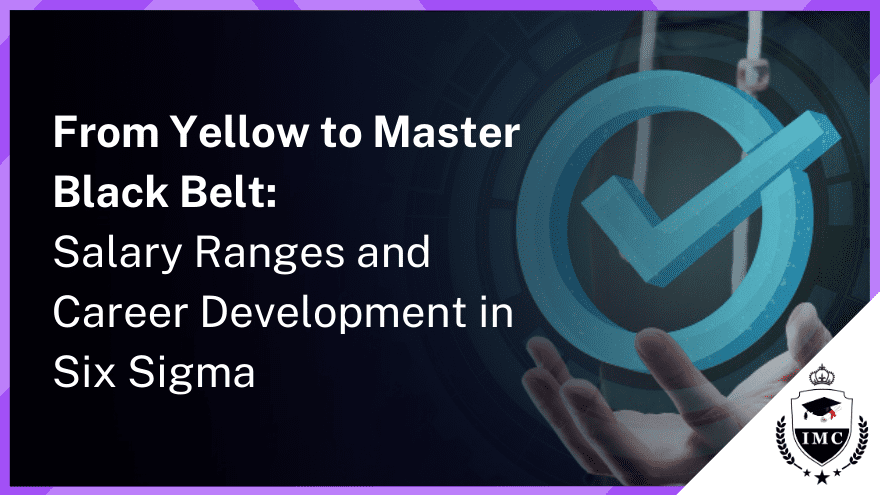With roots tracing back to the 1980s, Six Sigma has become one of the most widely used process excellence frameworks applied by leading global organizations. Professionals skilled in Six Sigma methodologies are highly valued across industries for their abilities to drive operational improvements and enable data-driven decision making. Given the rising adoption of Six Sigma worldwide, professionals with formal certifications can unlock lucrative career opportunities and earning potential. Let’s examine the salary ranges, job prospects and career growth that Six Sigma credential holders can expect.
An Overview of Six Sigma Certifications
Six Sigma certifications are structured into different competency levels, each aimed at developing expertise to execute projects of varying complexity:
- Yellow Belt – Basic introduction to core methodologies
- Green Belt – Skills for leading process improvement projects
- Black Belt – Expertise to lead strategically critical Six Sigma projects
- Master Black Belt – Highest level of knowledge and experience
Higher designations require passing rigorous written exams and demonstrate competency by completing project experience requirements. Accredited certifications like those offered by IMC Institute are globally recognized by employers.
Salaries for Certified Professionals
According to 2022 data from the American Society for Quality (ASQ), average salaries for Six Sigma professionals are:
- Yellow Belt - $77,000 per year
- Green Belt - $88,000 per year
- Black Belt- $103,000 per year
- Master Black Belt - $130,000 per year
The ASQ reports that non certified professionals earn an average salary of just $68,000 annually. Clearly, Six Sigma credentials can boost earning potential significantly. Beyond base pay, many companies offer incentives like bonuses, stocks and profit sharing for certified Six Sigma experts driving tangible process improvements. Published salary surveys by recruitment firms like Robert Half show that Six Sigma Black Belts can earn total compensation up to $150,000 per year on average.
Career Advancement Opportunities
Beyond attractive remuneration, qualified Six Sigma experts enjoy tremendous opportunities for assuming leadership and consulting roles during their careers. Skilled Black Belts and Master Black Belts are often tapped for senior quality management and operational excellence positions within large corporations. With further experience, professionals can become independent Six Sigma mentors, coaches and trainers serving multiple client organizations. According to recruitment firm, over 25% of Black Belts move into Director, VP or C-suite management roles during their careers. Many certified experts also become self-employed Six Sigma consultants charging premium fees, often exceeding $150 per hour.
High Job Demand Across Industries
Six Sigma jobs are available at global companies across manufacturing, financial services, healthcare, logistics, retail, IT/BPO, government and other sectors. For example, leading banks like Citi, HSBC and Emirates NBD actively hire Six Sigma experts to optimize processes, reduce errors, improve risk management and enhance customer service. Similarly, healthcare providers seek certified Six Sigma leaders to minimize medical errors, decrease patient wait times, and streamline clinical workflows. With exponential growth in data, MNCs also need Six Sigma analytics expertise to extract insights, guide decisions, and enable digital transformation.
In-Demand Skills Developed
In addition to competitive remuneration and career growth, Six Sigma credentials help professionals build in-demand skills like:
- Statistical analysis using Minitab, Excel, etc.
- Process mapping and analysis techniques
- Root cause analysis and problem-solving
- Data-driven decision making
- Change management and leadership
- Project management principles
- Quality management frameworks like Lean and ISO
- Presentation, communication and coaching skills
- These capabilities make certified individuals indispensable assets to employers seeking continuous improvement and operational excellence.
Six Sigma Certification Levels:
Six Sigma Yellow Belt Certification:
Ideal for those looking to understand foundational principles and kickstart their journey towards operational excellence.
Six Sigma Green Belt Certification:
This foundational course provides a robust understanding of Six Sigma principles and methodologies, enabling participants to identify and resolve basic process issues and contribute to project improvement initiatives.
Six Sigma Black Belt Certification:
Building upon the Green Belt knowledge, this comprehensive course equips participants with advanced Six Sigma techniques, enabling them to lead and manage complex process improvement projects, driving significant organizational improvements.
Six Sigma Master Black Belt Certification:
The pinnacle of six sigma training, equipping professionals to mentor and drive initiatives across organizations.
Summary
Given the rising global adoption of Six Sigma across sectors, qualified professionals have access to highly rewarding salaries along with abundant opportunities for assuming leadership roles during their careers. With reputable and accredited Six Sigma Certification like those offered by IMC Institute , candidates can unlock their true career potential in this exciting field. The in-demand expertise also enables professionals to become trusted advisors shaping the operational future of global organizations.






